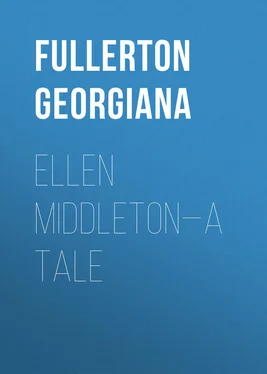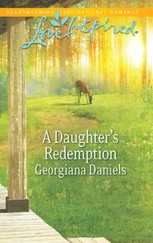Georgiana Fullerton - Ellen Middleton—A Tale
Здесь есть возможность читать онлайн «Georgiana Fullerton - Ellen Middleton—A Tale» — ознакомительный отрывок электронной книги совершенно бесплатно, а после прочтения отрывка купить полную версию. В некоторых случаях можно слушать аудио, скачать через торрент в формате fb2 и присутствует краткое содержание. Жанр: foreign_religion, foreign_antique, foreign_prose, на английском языке. Описание произведения, (предисловие) а так же отзывы посетителей доступны на портале библиотеки ЛибКат.
- Название:Ellen Middleton—A Tale
- Автор:
- Жанр:
- Год:неизвестен
- ISBN:нет данных
- Рейтинг книги:4 / 5. Голосов: 1
-
Избранное:Добавить в избранное
- Отзывы:
-
Ваша оценка:
- 80
- 1
- 2
- 3
- 4
- 5
Ellen Middleton—A Tale: краткое содержание, описание и аннотация
Предлагаем к чтению аннотацию, описание, краткое содержание или предисловие (зависит от того, что написал сам автор книги «Ellen Middleton—A Tale»). Если вы не нашли необходимую информацию о книге — напишите в комментариях, мы постараемся отыскать её.
Ellen Middleton—A Tale — читать онлайн ознакомительный отрывок
Ниже представлен текст книги, разбитый по страницам. Система сохранения места последней прочитанной страницы, позволяет с удобством читать онлайн бесплатно книгу «Ellen Middleton—A Tale», без необходимости каждый раз заново искать на чём Вы остановились. Поставьте закладку, и сможете в любой момент перейти на страницу, на которой закончили чтение.
Интервал:
Закладка:
When it became dusk the solitude of my room grew intolerable to me, and I wandered through the house seeking for companionship, and yet starting off in a different direction, if the sound of steps or of voices drew near to me. At last I found my way unobserved into the drawing-room, and sat there, or paced up and down for a length of time, till at last the door opened, and my uncle came in.
He walked up to me, laid his hand on my shoulder, and said, in a voice of subdued emotion "You are now our only child, Ellen."
I suppose my countenance bore a very wild expression at that moment, for he looked at me with surprise, and then added in a still more soothing manner, "Go to your aunt, my dear Ellen; she will not feel herself childless while you are spared to us."
A choking sensation rose in my throat, and a cold sweat stood on my forehead, but I got up, and walked resolutely to my aunt's room.
She was overwhelmed with grief; her hands were feverish, and her head burning. I sat down by her, and silently employed myself in bathing her temples with cold water. She now and then laid her aching head on my shoulder, and burst into an agony of crying, which seemed to relieve her.
She asked me where my uncle was; and I could have told her, for I had heard the servants say, as I was coming up stairs, that he was returning to the river side, to make one search more after the body of his child.
The moon was shining brightly, and several men were employed in dragging the deep and rapid stream; I pointed that way, and she seemed at once to understand me, for a deep groan was her only answer. Once she said, "Pray for me, Ellen;" and then for the first time remorse took its place by the side of terror in my mind. I felt I could not pray – no exactly-defined idea of guilt presented itself to my mind, and yet there was a murmur in my ears, the burden of which was, "She has killed her – she has killed her;" (and as when standing on a dizzy height, with a firm hold on some railing or plank of support, something whispers to one, "If I should let it go!") I felt afraid that the next moment I should say out loud, "I have killed her."
The idea of prayer made me tremble. Once I said mechanically, "O God! forgive me," and then shuddered. It sounded to myself like a confession of murder. I dared not address God as I had done the day before. One instant I thought of myself as of a guilty wretch, unworthy to live, unworthy to lift up her voice in prayer, or to raise her eyes to the calm and cloudless sky. At other times I felt as if God had dealt too hardly with me: I pitied myself, and my heart waxed rebellious in its grief. I said to myself, like Cain, "My punishment is greater than I can bear;" and then I almost cursed myself for having thought of Cain – for I had not murdered my cousin, though somebody said I had killed her. For one instant anger had maddened me; without thought, without intention, I had struck her – one hasty blow was given, and now my youth was blighted, my peace of mind was gone; the source of all pure joys, of all holy thoughts, was dried up within me. I should never stand again in the sacred silence of the solemn night, and feel as if its whispering winds were bringing tidings from a better world to my soul. And in those days of glowing beauty, when streams of light intoxicate the eye, when all nature breaks into song, or blossoms into flower, never again should I feel myself as in past years, a part of that bright creation, longing only, in the fulness of my heart, to prostrate myself in fervent adoration before Him who gave to the birds and to the streams a voice to praise Him; to the glorious heavens a charge to magnify Him; and to man, enthusiasm, emotion, poetry, music — all that lifts the soul above itself and the material world around it, to the wide fields of enraptured contemplation.
But now a chain would evermore weigh down my spirits – a dark remembrance would ever stand between me and the sunny skies – a tone, as of the dying and the dead, would ever mingle with the sounds of melody, with the voice of love, with the words of affection. Yes —
"All bright hopes and hues of day
Had faded into twilight grey;"
or rather into the darkness of night. I wept over myself, over my blighted youth, my destroyed happiness, my lost innocence – and I was only sixteen!
There I sat, that long night through; my aunt had sunk into the heavy slumber of exhaustion, her hand in mine, her head on my shoulder. I dared not move – scarcely breathe; hot searing tears were slowly chasing each other down my cheeks, and the storm within was raging wildly in my breast – but I did not pray; I could not: a sheet of lead seemed to stretch itself between me and Heaven; and when the light of day broke slowly into the chamber of mourning, I closed my eyes, not to see the sun in its calm majesty, dawning on the first day of changed existence.
The first days that follow a great and sudden misfortune carry with them a kind of excitement that keeps off for a time the stunning sense of desolation from the soul. My uncle returned on the following morning, bearing with him the body of his child, which he had at length succeeded in rescuing from the bed of the torrent, which had carried it down far below Elmsley.
The preparations for the interment in the village church seemed to rouse the afflicted parents to exertions, that, though intimately connected with the loss that had befallen them, were almost a relief to Mrs. Middleton, after the inactivity of the last twenty-four hours.
I had hardly left her room all day, and when she told me that my uncle expected us all to meet him at dinner, I felt it would be impossible to go through the trial; but, as she was going to make the exertion, I could not refuse to follow her.
When we entered the drawing-room together, Edward Middleton and Henry Lovell were both standing before the fire-place. It was well for me that our meeting took place while the catastrophe of the day before was so recent, that the agitation I betrayed could pass under the garb of sorrow and nervousness. I was trembling violently; I felt a degree of conviction, that amounted to moral certainty, that one of those two men had witnessed the frightful scene, which resembled more a hideous dream than an actual reality. Both were coming to me with outstretched hands. Could they both mean to take mine? Did not one of them know what that hand had done? A mist rose before my eyes, and I fainted.
When my senses returned, I found myself in bed, my aunt by my side, and a number of restoratives employed to bring me back from my swoon. I recovered, and the next morning, on awaking after some hours of feverish and restless sleep, I heard a noise in the court under my windows.
I rose hastily, and saw the funeral procession moving slowly from the house across the grounds, and taking its way towards the village church. The little coffin was carried by four of the grey-headed servants of the house; my uncle and aunt were walking on foot beside it, and my cousin and Henry Lovell were following them. The rest of the servants, among whom was Julia's nurse, and almost all the inhabitants of the village, closed the procession. I watched the funeral train till it was out of sight, and for the first time I forgot myself, for a few minutes, and my own dreadful share in this calamity, and thought only of my aunt, and of her misery. I called to mind too the image of that child, whom I had so often nursed to sleep in her infancy, whom I had carried in my arms, and held to my bosom. When I pictured to myself the little body laid in its narrow grave, and thought how short a time ago life was strong within it, and that it was my hand that had sent her to her watery grave, my agony grew so intense that I wonder it did not kill me, or drive me to some desperate act of madness. It did not; and pity for myself soon hardened my heart against the sufferings of others. I ceased to weep for Julia; she was dead indeed; but was not death a blessing compared to such a life as mine would be? My aunt had lost her child; but was not her sorrow as nothing in comparison with mine – mine, who had made her childless? And now a sudden thought flashed on my brain. Why was I at home? Why was I alone? Did they suspect me? Had the master of my fate, the witness of my crime, warned them to keep the murderess away from the grave of their child? Was I already become as a monster to them? Did they loathe the sight of me? Would they send me to prison? or would they turn me out of their house; and should I fly along dusty roads, and through dark alleys and crowded streets, and would the mob follow, as I once read that they followed a woman who was thought to have murdered her child, and point at me, and hoot, and groan, and cry "There goes the wretch that murdered the child?" I fell on my knees; it seemed as if there was a sound of footsteps behind me – a shout of execration in my ears. It wan a waking nightmare; I was growing delirious, and when I felt something touch me, and a warm breath on my shoulders, I gave a piercing scream, and fell with my face on the ground. A low moaning roused me from this state. I looked up and saw my great Newfoundland dog, who always slept in my room; he was licking my hands and neck. His kind eyes were looking at me from under the rough hair that shaded them; and he moaned gently as he did so. I was still almost a child, for I suppose that none but a child would have found comfort in this creature's mute sympathy. As it was, I flung my arms wildly round its neck, and sobbed. He did not struggle, but patiently stood there, though my tears were falling fast on his head. "Poor, poor Hector I you never will be told what I have done; you never will turn away from me with horror, though all the world should do so. Poor, poor Hector! my good, my kind dog!" This little incident had done me good, and the tears I had shed had relieved me. I dressed myself, and when my aunt entered my room at her return from the funeral – when she embraced me with much emotion – when she told me how she and my uncle had hoped that I might have slept over the last trying hour – when she tenderly reproached me for having left my bed – when she drew me to her, and, parting the hair that hung loosely and heavily on my forehead, laid her cold hand upon it, and then pressed me to her bosom – I felt a relief that for the moment almost resembled joy. Under the influence of this momentary reaction I followed her to the dining-room, where we found my uncle sitting in mournful silence; he pressed my hand as I approached him, and we all sat down to eat, or try to eat, the breakfast prepared for us. This melancholy meal over, I withdrew to the furthest end of the drawing-room, and sat down at my embroidery frame, which stood near to an open window, and began to work with something like composure. From this moment everything about us resumed its former aspect, and the habits of our daily life seemed to have experienced scarcely any change. My uncle's reserve and gloom were, perhaps, somewhat deeper than before; and Mrs. Middleton at times gave way to uncontrollable bursts of grief; but her elastic spirit, bowed down for awhile by the pressure of sorrow, rose again with the buoyancy which affliction can repress, but hardly destroy in a nature like hers, to which happiness seemed almost a condition of existence. A sorrow which would have broken this spring within her must have killed her – but this did not; and the full flow of her affections seemed to return in what had once appeared to be their natural channel – she clung to me with a fondness that seemed every hour to increase. Superior as she was, there was about her a kind of dependence upon others – upon their love and their sympathy – which was inexpressibly endearing. In those early times of sorrow I received her caresses, and listened to the words of love which she addressed to me, with something of the spirit with which I can imagine that the Holy Françoise de Chantal may have pressed to her bosom the burning cross, that stamped upon her breast the sign of salvation,* [* Madame de Chantal, the Founder of the Order of the Visitation, impressed upon her breast, with a burning iron, the sign of the cross.] – at once the object of intense adoration and the instrument of acute torture.
Читать дальшеИнтервал:
Закладка:
Похожие книги на «Ellen Middleton—A Tale»
Представляем Вашему вниманию похожие книги на «Ellen Middleton—A Tale» списком для выбора. Мы отобрали схожую по названию и смыслу литературу в надежде предоставить читателям больше вариантов отыскать новые, интересные, ещё непрочитанные произведения.
Обсуждение, отзывы о книге «Ellen Middleton—A Tale» и просто собственные мнения читателей. Оставьте ваши комментарии, напишите, что Вы думаете о произведении, его смысле или главных героях. Укажите что конкретно понравилось, а что нет, и почему Вы так считаете.












